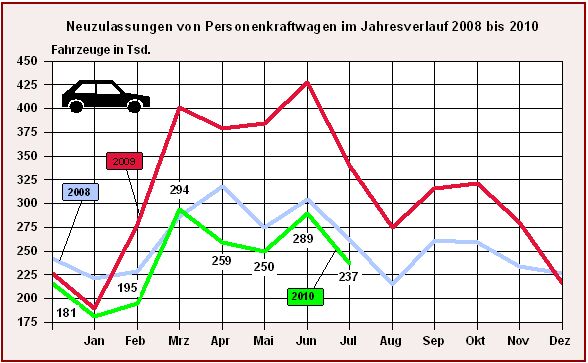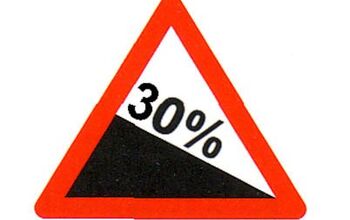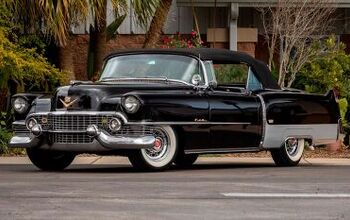Germany In July 2010, Official: Down 30.2 Percent

Official numbers for July sales in Germany are out now, and did we mention that the Verband der Importeure VDIK (German Association of Car Importers) is usually reliable? They said 237.500 cars in July. The official number, as reported by the Kraftfahrtbundesamt, is 237.428. The official drop is 30.2 percent.
As the graph about shows, not only are July sales way below 2009, they are also 9.8 percent below July 2008. That’s the alarming part. The summer of 2009 was distorted by cash-for-clunker money.
What is interesting is a looks at the segments. The mini car segment took a 50 percent nosedive. Speed and displacement are on the rebound: The upper middle-class grew by 21.8 percent. SUVs, formerly pronounced dead, emerged from the grave to the tune of plus 37.8 percent. Sports cars increase their sales by 18.6 percent.
The brands echo this trend: Porsche up 14.3 percent. Mercedes up 8.1 percent, BMW up 3.7 percent. The volume producers mirror the mediocre market: Opel -43.5 percent, Ford -38.6 percent, VW -33.9 percent. Bloodbath in Nippon: Suzuki –59.4 percent. Toyota -46.7 percent.
Miracle of the month: Land Rover +96.1 percent.
All data (in German, but numbers and graphs speak their own language) can be downloaded here.

Bertel Schmitt comes back to journalism after taking a 35 year break in advertising and marketing. He ran and owned advertising agencies in Duesseldorf, Germany, and New York City. Volkswagen A.G. was Bertel's most important corporate account. Schmitt's advertising and marketing career touched many corners of the industry with a special focus on automotive products and services. Since 2004, he lives in Japan and China with his wife <a href="http://www.tomokoandbertel.com"> Tomoko </a>. Bertel Schmitt is a founding board member of the <a href="http://www.offshoresuperseries.com"> Offshore Super Series </a>, an American offshore powerboat racing organization. He is co-owner of the racing team Typhoon.
More by Bertel Schmitt































Comments
Join the conversation
What those graphs also show is that, in Germany, cash-4-clunkers actually did increase the new market. During the program, most people were screaming that all it would do is pull sales forward, but overall the increase in 2009 makes up for way more than the decrease in 2010. Combined with the now increasing globald demand, I'd call it a success...probably killed the used market last year though... ;) Oh, and I crunched some numbers for some other board, if anyones interested: Selected manufacturers compared from July 2008 to July 2010. (Numbers in brackets are Jan-Jul 2010/2008), to get some of the AWP-distortions out...) Market: -9,5% (-10%) Audi: -12% (-11%) BMW, Mini: -10,5% (-10%) Fiat: -5% (-11%) Ford: -8% (-7%) Mercedes: -13,5% (-20%) Opel: -14,5% (-20,8%) Skoda: -17% (+2%) Toyota, Lexus: -18% (-34%) VW: -15,5% (+-0%)